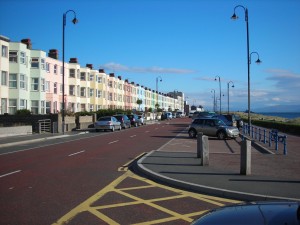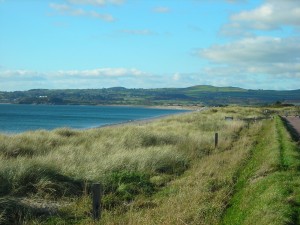When someone asks me “where do you come from”, my reply is generally “I’m Welsh. A Welsh Jones. Descended from a long line of Joneses” (and Lewises and Williamses and Howells and so on). But then I have to qualify this, not least because I don’t sound Welsh: I sound like someone who’s spent 15 years in Cambridge (with maybe a bit of east midlands/Yorkshire influence). I was born in England (Stamford, Lincolnshire); my father had left Wales to join the Air Force, so my early childhood was spent trailing around a series of RAF bases in the Midlands and Eastern England. It was only after I finally left home that my parents moved back to Wales. The only time I properly lived in Wales myself was for a year in 1967, an experience that was so alienating and unhappy that, even though it was a short time, and a long time ago, it colours my emotional response to that part of North Wales, the Lleyn Peninsular.
The circumstances were this – after a couple of postings in East Anglia, my father was sent abroad, to help with what turned out to be the shambolic and violent end of one corner of the British Empire, in Aden, now in the Yemen. Aden was then a Crown Colony, a strategic port and military base for the British, usefully placed on the way to India and the Far East. Britain’s retreat from Empire reduced the port city’s value, but through the mid-1960’s a worsening insurgency had destabilised the British’s attempt to install a friendly government before they left. By 1967 parts of the city were alternately a no-go zone for the British troops, then being reoccupied with some brutality. Finally (and I think uniquely in the end of Empire) there was no orderly hand-over when the British left, no ceremonial lowering of the flag, no hand-shakes between the Governor-General and the incoming President, just a scramble by the British forces to get out with as much of their kit as they could carry. My father’s part in the retreat, having organised the repatriation of the remaining families, was to tip Radio Aden’s record collection off the Steamer Point quay into the harbour, to make sure the Communist hordes of FLOSY and NLF didn’t benefit from the latest Jazz and Pop sounds (for some reason he saved one Thelonius Monk album, which I still possess).
Aden was clearly not a place for dependents, so my mother and I were packed off to the North Wales seaside town of Pwllheli, where my mother’s parents lived. There my mother tried to avoid reading the newspapers, with their reports from Aden of random shootings and grenade attacks, while the six-year-old me went off friendless to a new school. I remember the terrible food and the boys’ toilet, outside, in the corner of the playground, a slate urinal brilliant green with moss and with an overwhelming ammoniacal smell of decaying boys’ urine. The school was old-fashioned in teaching methods and discipline – I vividly remember an assembly with a purple faced teacher standing on a stage, roaring with anger and threateningly waving his stick above his head. I never found out what atrocity it was that some child had committed, as the diatribe was conducted, like all the other business of the school, entirely in Welsh, a language I didn’t know then (and still don’t).

West End Parade, Pwllheli, N. Wales. A flat in one of these houses was my unhappy home for a year.
My mother must have been bored, worried, lonely. At least she had a car, a sweet little Mini, in which she frequently drove me to Caernarvon Castle, with which I became fascinated. She would take her own father on trips a few miles up the coast, to see his friend, the priest and poet R.S. Thomas. I don’t exactly know what had drawn Thomas and my grandfather together, whether that was religion, or poetry, or simply a shared gloomy disposition. My grandfather died before I got to know him properly; I know he was a cultured man, though he had dropped out of theological college to become a Conservative Party activist.
Something I don’t remember myself, but which my mother tells me, is that for the first few months I refused to talk about my father at all, or even acknowledge his existence. If I went into my mother’s bedroom, I would silently turn the photograph of him to face the wall. I do remember him arriving on his first leave, in the autumn. By that time, he’d been transferred from Aden to RAF Sharjah, in what is now the United Arab Emirates. He brought back souvenirs – a piece of lava from Aden, some coral, chunky silver Maria Theresa dollars, a couple of keffiyehs. Sharjah was a much more relaxed posting for him than Aden; one aspect he clearly enjoyed and still talks about was the trips he made into the backcountry with the RAF Mountain Desert Rescue Team (whose task was to rescue downed RAF aircrew), exploring the rocky mountains and wadis. So he also brought back a climbing rope, which he used to take me scrambling on Gimlet Rock, the lump of granite at the end of the Pwllheli seafront. And even after he’d returned to the Middle East, I think we were all a bit more settled.
One thing that still puzzles me about this year was why I didn’t learn any Welsh. I was, after all, a year in an environment of pretty much total immersion in the language, at an age when language learning should still come easily (and indeed despite another 3 years in a more bilingual Welsh school where I was formally taught the language, I didn’t get much further). I can probably still, at a push, recite my times tables in Welsh, undoubtedly with huge benefits for my numeracy, and the sounds of the language and its written forms are familiar to me, but of conversation I have none. The only explanation I can think of is that I simply didn’t talk to anyone.

Looking west along the beach, Pwllheli
So what did I do? What I remember above all is walking along the beach, a sweep of dune-backed shingle stretching out towards impossibly distant seeming Llanbedrog. I’d look for what the sea had washed up – a jellyfish the size of a dinner plate, a buoy big enough to have a ladder and a compartment inside (but no dead sailor, I looked), the twisted rails of the old tramway, exposed in the dunes after a winter storm. There was man who would fly a golden eagle from his wrist. I gazed at the sea with enough intensity that one day I spotted distant wreckage; I was taken seriously enough for it to be reported to the coastguard. I got to stand up in front of my class and tell them about it, but I never found out what it was.
The year came to an end, my father returned, and we all moved to his next posting, RAF Cosford, just outside Wolverhampton. There I was happy, and conscious of my changed good fortune, with a gang of friends to wander round the base with, going to a progressive school whose modern, child-centred teaching approach meant that I could avoid doing any school work at all and stay at the back of the class playing with blocks. My grandparents both died within a few years, and after that there was no cause to visit Pwllheli again. Much later – as a graduate student – I did return to the Lleyn peninsular a few times. I was conducting a programme of exploratory rock-climbing with my friend Brian Davison, and the esoteric sea-cliffs of the Lleyn tempted us to a couple of forays. On one we did a character-building new route on Craig Dorys, which we called “Error of Judgement” (“it certainly was”, says the guidebook, ”an appallingly loose line” – some accolade, given the overall reputation of the Lleyn for crumbling cliffs). Another time Brian led a tenuous line up a weirdly scalloped wall on the granite quarries in Llanbedrog, which was then certainly the hardest route technically in the area. And just a few years ago, facing a revolt from my family that when we went to the seaside it always had to be Pembrokeshire (a part of Wales that has only the happiest associations for me, but which is a punishingly long drive from our Derbyshire), we took a short trip to the Lleyn coast. This ended in me being badly bitten in the groin by a loose Alsatian, which (I’m sure quite unfairly) hasn’t made me any keener on the area.
Readers with even a cursory acquaintance with Welsh culture will recognise the first part of this post’s title from the Welsh national anthem. The addendum is ascribed to that other great Welsh poet called Thomas, Dylan. He was someone both my parents idolised, perhaps as symbolic of their generation, who wanted to leave the small, small-minded, provincial Welsh towns they were brought up in and make something more of themselves (and unfashionable though Dylan Thomas may now be, I too love the lyricism, the bombast, the black humour of his work). And yet, a couple of months ago, as I attended the funeral of my godfather John Lewis-Davies, in a beautiful and very English church outside Hereford, loudly singing Cwm Rhondda and Mae hen wlad fy nhadau with my cousins, to remember John’s pride in his Welshness, moved me too.
An interesting piece.
It’s a shame you arrived in Pwllheli under such circumstances.